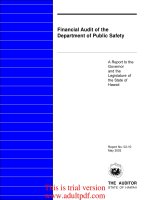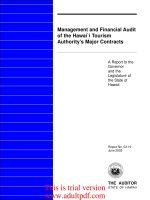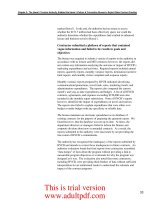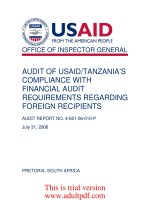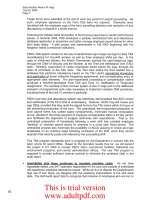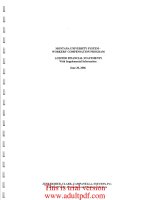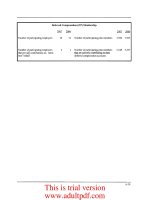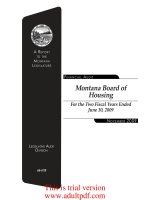FINANCIAL AUDIT Trans-Alaska Pipeline Liability Fund _part1 pdf
Bạn đang xem bản rút gọn của tài liệu. Xem và tải ngay bản đầy đủ của tài liệu tại đây (656.53 KB, 10 trang )
!
. . “-I.
IllriltLrl Stattbs (;t~~It~ral At*t*ort~~tirlg Ol’l‘iw
- - - _ ._._ ____.__._ I- ._ ,. 111 . .“lll
. “I ._ _ I . - ^ - _ ”
_ ~ _ “ _II. -ll.~ “ l~l”ll~ l-
.+,
.” __ -~__ _
FINANCIAL AUDIT
Trans-Alaska Pipeline
Liability Fund
145673
This is trial version
www.adultpdf.com
This is trial version
www.adultpdf.com
GAO
united states
General Accounting Office
Washington, D.C. 20548
Comptroller General
of the United States
B-208638
January 17,1992
To the President of the Senate and the
Speaker of the House of Representatives
This report presents the results of our review of the independent certi-
fied public accountants’ audit of the Trans-Alaska Pipeline
(TAP)
Lia-
bility Fund’s financial statements as of December 31, 1990. We also
assessed progress toward disposing of the
TAP
Fund’s balances and ter-
minating the Fund in accordance with section 8102 of the Oil Pollution
Act of 1990 (Public Law 101-380).
In the auditors’ opinion, the
TAP
Fund’s financial statements as of
December 31, 1990, are fairly presented in all material respects in accor-
dance with generally accepted accounting principles. The independent
auditors’ reports on the
TAP
Fund’s internal control structure and on its
compliance with laws and regulations are also provided. As of Decem-
ber 31, 1990, the
TAP
Fund had $286 million of net assets available to
pay outstanding claims and administrative expenses. No amounts are
currently available for transfer to the Oil Spill ‘Liability Trust Fund due
to the pending claims and associated administrative expenses. The
TAP
Fund cannot be terminated until these claims are settled and expenses
paid.
The Trans-Alaska Pipeline Liability Fund is a nonprofit corporate entity
created in 1973 by the Trams-Alaska Pipeline Authorization Act
(43 USC. 1663(c)(4)). The
TAP
Fund is governed by the U.S. Department
of the Interior and administered by a Board of Trustees. The Fund was
established to pay claims for damages, including cleanup costs, resulting
from oil discharges from vessels transporting Trans-Alaska Pipeline
System oil loaded at Alaskan terminals to ports under U.S. jurisdiction,
a
The
TAP
Fund was initially funded up to $100 million by assessing
owners of oil, including the state of Alaska, a fee of 5 cents per barrel of
oil loaded at the Trans-Alaska terminal at Valdez, Alaska. The liability
of the
TAP
Fund is generally limited to that increment of damages in
excess of $14 million, but not in excess of $100 million, per oil spill inci-
dent occurring before August 18, 1990. Additional information on the
organization and the purpose of the
TAP
Fund is provided in the notes to
the financial statements, which are included in this report.
The Oil Pollution Act of 1990 provides that the
TAP
Fund shall reserve
amounts necessary to pay administrative expenses and to pay appli-
cable claims. Once the Comptroller General certifies that these reserves
Page1
This is trial version
www.adultpdf.com
have been established, the state of Alaska is to be reimbursed for its pro
rata share of contributions to the
TAP
Fund, and remaining fund equity
balances are to be transferred to the Oil Spill Liability Trust Fund. This
new fund was created to provide compensation for damages resulting
from incidents occurring on or after August 18, 1990. The
TAP
Fund will
then be terminated 60 days after the Comptroller General of the United
States has certified that all claims have been resolved and all adminis-
trative expenses have been paid.
The Trans-Alaska Pipeline Liability Fund contracted with an indepen-
dent certified public accounting firm, Deloitte & Touche, to audit its
1990 financial statements. We reviewed&e 1990 audit under provisions
of the Trans-Alaska Pipeline Authorization Act, which authorize us to
audit the
TAP
Fund’s financial transactions, and the Oil Pollution Act,
which requires that we certify that reserves have been established and
all claims and expenses paid. To fulfill our responsibilities, avoid dupli-
cation and unnecessary expense, and make the most efficient use of our
available resources, we reviewed the independent auditors’ work and
reports.
We conducted our review of the auditors’ work in accordance with gen-
erally accepted government auditing standards. To determine the rea-
sonableness of the auditors’ work and the extent to which we could rely
on
it, we
l
reviewed the auditors’ approach and planning of the audit;
. evaluated the qualifications and independence of the audit staff;
. reviewed the financial statements and auditors’ reports to evaluate corn-
pliance with generally accepted accounting principles and generally
accepted government auditing standards; and
l
reviewed the auditors’ working papers to determine (1) the nature,
timing, and extent of audit work performed, (2) the extent of audit
quality control methods the auditors used, (3) whether the auditors
obtained an understanding of the
TAP
Fund’s internal control structure,
(4) whether the auditors tested transactions for compliance with appli-
cable laws and regulations, and (5) whether the evidence in the working
papers supported the auditors’ opinion on the financial statements and
on the internal control structure and compliance reports.
In the opinion of Deloitte & Touche, the Trans-Alaska Pipeline Liability
Fund’s financial statements present fairly the net assets available for
claims and expenses as of December 31, 1990, and the changes in net
Page 2 GAO/AFMD-92-29 Trans-Alaska Pipeline Liability Fund
This is trial version
www.adultpdf.com
B-208638
assets available for claims and expenses for the year then ended, in con-
formity with generally accepted accounting principles. The auditors’
opinion also emphasizes that an uncertainty exists in determining lia-
bility for potential claims and administrative expenses which may
exceed net assets available for claims. The 1989 financial statements,
which are presented for comparative purposes, were also audited by
Deloitte & Touche; however, our review was limited to the 1990 finan-
cial statements. Deloitte & Touche’s reports on internal control structure
and on compliance with laws and regulations did not disclose any mate-
rial weaknesses or noncompliance with laws and regulations.
During our review, we found nothing to indicate that Deloitte &
Touch& opinion on the
TAP
Fund’s 1990 financial statements is inappro-
priate or cannot be relied on. Nor did we find anything to indicate that
the auditors’ reports on internal control structure and on compliance
with laws and regulations were inappropriate or cannot be relied on. We
believe that the financial statements, together with Deloitte & Touche’s
opinion and our review of that work, provide the Congress with a
dependable basis for evaluating the
TAP
Fund’s financial position.
The Exxon Valdez
Claim
On March 24,1989, the Exxon Valdez, an oil tanker owned and operated
by the Exxon Shipping Company and loaded with oil from the Valdez
terminal, ran aground off the coast of Alaska causing a 240,000 barrel
oil spill. Total damages related to the spill far exceeded the
TAP
fund
liability per incident of $100 million, less the $14 million deductible,
established in the Trans-Alaska Pipeline Authorization Act. Litigation
filed subsequently alleged that multiple incidents occurred. While the
Fund vigorously disputes that contention, its potential liability for this
claim and others as well as administrative expenses may exceed the
Fund’s $286 million of net assets available for claims as of December 31,
A
1990. However, the Fund is authorized, subject to the approval of the
Secretary of the Interior, to borrow money needed to pay claims from
any commercial source. In addition, should the value of the
TAP
Fund
drop below $100 million, the
TAP
Authorization Act provides for replen-
ishing the Fund through assessing a fee of 6 cents per barrel of oil
loaded at the Valdez pipeline terminal.
The Exxon Shipping Company and the
TAP
Fund initially agreed that
Exxon would administer and pay all Exxon Valdez claims and could sub-
sequently submit claims to the
TAP
Fund for reimbursement. The act’s
implementing regulations require that all claims must be submitted
within 2 years of an event. On December 14,1990, a federal court ruled
Page 3 GAO/AFMD-92-29 Trans-Alaska Pipeline Liability Fund
This is trial version
www.adultpdf.com
B-208638
that claimants were required to seek administrative resolution of claims
with the
TAP
Fund before proceeding against the Fund in court. The
court also ruled that the
TAP
Fund could not delegate its responsibility to
settle claims to the Exxon Shipping Company. Accordingly, the
TAP
Fund
terminated its agreement with Exxon and established a claims handling
function. It is now in the process of evaluating more than 29,000 claims
currently pending for administrative resolution with the
TAP
Fund. The
Fund hopes to have these claims resolved by March 1, 1992. Under
43 U.K. 1653(c)(2), the Fund is not strictly liable for damages arising
from a claimant’s negligence. Accordingly, the
TAP
Fund intends to con-
test any claims filed by the Exxon Shipping Company. The
TAP
Fund
also intends to seek reimbursement from Exxon for any third-party
claims paid arising from the Exxon Valdez incident. Note 4 to the 1990
financial statements discloses all contingencies against the
TAP
Fund.
Since
TAP
Fund officials are still in the process of resolving claims
against it and incurring associated administrative expenses and since
the total amount payable under those claims may exceed the current net
assets of the Fund, the trustees of the Fund have not established
reserves for claims and expenses as provided in the Oil Pollution Act.
Accordingly, we cannot make the certifications which initiate distribu-
tion of the Fund’s balances. We will monitor the Fund’s progress in
resolving claims against it and certify balances as required by section
8102 of the Oil Pollution Act of 1990.
We are sending copies of this report to the Director of the Office of Man-
agement and Budget, the Secretary of the Treasury, the Secretary of the
Interior, and the Chairman of the Board of Trustees of the Trans-Alaska
Pipeline Liability Fund.
Charles A. Bowsher
Comptroller General
of the United States
Page 4
GAO/AFMD-92-29 Tram-Alaska Pipeline Liability Fund
This is trial version
www.adultpdf.com
.
a
Y
Page 5
GAO/APMD-92-29
Trans-Alaska Pipeline IdabilIty F’und
This is trial version
www.adultpdf.com
contents
Opinion Letter
1
Auditors’ Opinion
Auditors’ Report on
Internal Control
Structure
9
Auditors’ Report on
11
Compliance With
Laws and Regulations
Financial Statements
12
Statements of Net Assets Available for Claims and 12
Expenses
Statements of Changes in Net Assets Available for Claims
13
and Expenses
Notes to Financial Statements 14
Abbreviation
‘I-AI’
Trans-Alaska Pipeline
Page 6
GAO/AFMD62-29 Trane-Alaska Pipeline Liability Fund
This is trial version
www.adultpdf.com
Page 7
a
GAO/AFMD-92-29 Trans-Alaska Pipeline Liability Fund
This is trial version
www.adultpdf.com
Auditors’-hinion
Deloitte &
Touche
1OOOWllshlre Boulevard
Telex 9103214090
Los Angeles, Callfornla 90017-2472
Facslmlle (213) 688-0100
Telephone (213) 688-0800
JNDEPENDENT AUDITORS' REPORT
To the Board of Trustees of Trans-Alaska Pipeline
Liability Fund:
We have audited the accompanying statements of net assets available for claims
and
expenses of the Trans-Alaska Pipeline Liability Fund (the "Fund") as of
December 31,
1990 and 1989,
and the related statements of changes in net assets
available
for
claims
and
expenses for the yeara then ended.
These financial
statements are the responsibility of the Fund's management.
Our responsibility
is to express an opinion on these financial statements based on our audits.
We
conducted our audits in accordance with generally accepted auditing
standards and the standards for financial audits contained in the U.S. General
Accounting Office Government Auditina Standards (1968 Revision).
Those
standards require that we plan and perform the audit to obtain reasonable
assurance about whether the
financial statements are free of material
misstatement.
An audit includes examining, on a test basis, evidence
supporting
the amounts
and disclosures in the financial statements. An audit
also includes assessing the accounting principles used and significant
estimates made by
management,
ae
well as evaluating the overall financial
statement presentation.
We believe that our audits provide a reasonable basis
for our opinion.
In our opinion,
the financial statements referred to above present fairly, in
all material respects,
the net assets available for claims and expenses of the
Trans-Alaska Pipeline Liability Fund as of December 31, 1990 and 1989, and the
changes in net assets available for claims and expenses for the years then
ended,
in conformity with generally accepted accounting principles.
As discussed in Notes 4 and 5, there are certain claims against the Fund.
Because of the complexity of these claims under the Trans-Alaska Pipeline
Authorization Act (the
"TAP Authorization Act"), it is not currently possible
to determine the liability, if any, under such claims, or when any amounts
would be required to be paid by the Fund.
Resolution of these contingencies
may result in liabilities in excess of the net assets available for claims, in
which case,
additional fee incorn* would have to be collected in accordance with
the provisions of the TAP Authorization Act.
Further,
upon resolution of these
contlngencles,
it is contemplated that any remaining net assets of the Fund
would be transferred to a new fund under the Oil Pollution Act of 1990.
September 24, 1991
-_I
Page 8
GAO/AFMD-92-29 Trans-Alaska Pipeline Liability Fund
This is trial version
www.adultpdf.com
